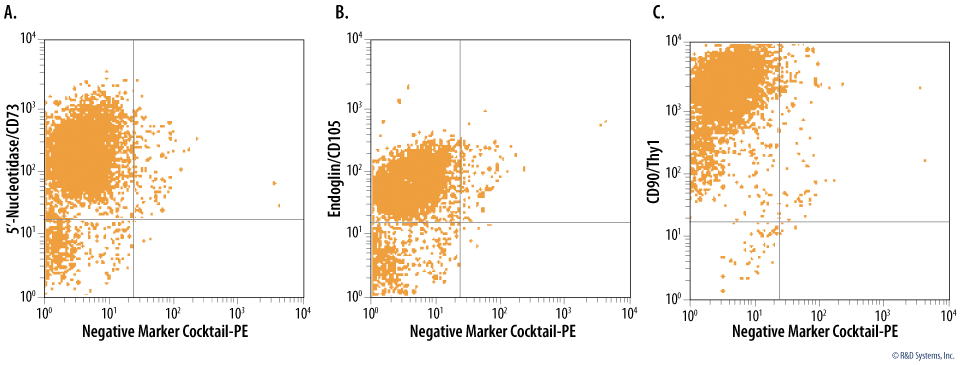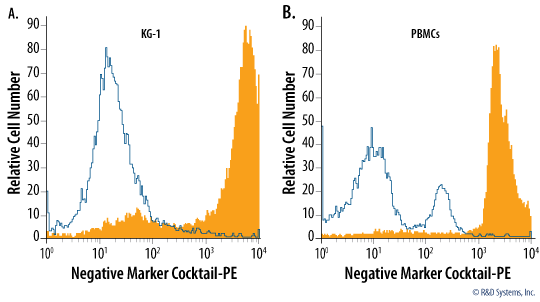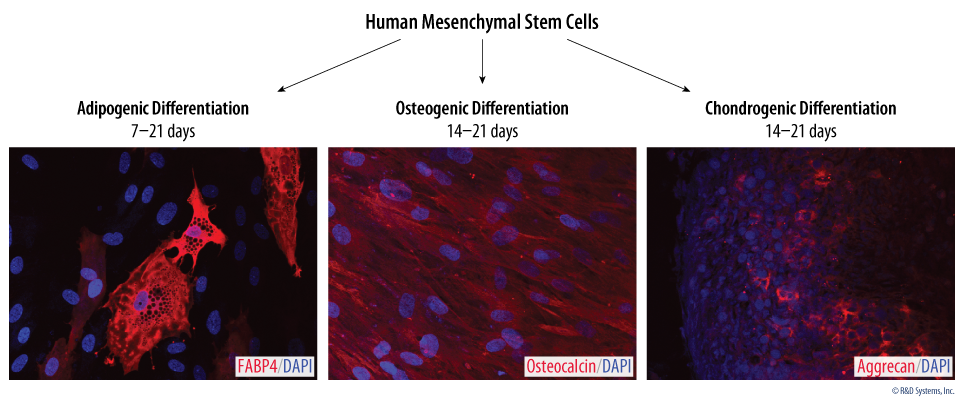Human Mesenchymal Stem Cell Verification Flow Kit
Human Mesenchymal Stem Cell Verification Flow Kit Summary
Kit Summary
Antibodies for MSC verification according to the markers proposed by the International Society for Cellular Therapy.
Why use the ISCT-recommended Markers to Verify MSC Identity?
The different methods used to isolate, culture, differentiate, and define mesenchymal stem cells (MSCs) can lead to experimental variability and contradictory data. In an attempt to standardize the definition of mesenchymal stem cells, in 2006, the International Society for Cellular Therapy (ISCT) proposed the minimal criteria to define MSCs.1 See Details
Included in these criteria were recommendations for the positive and negative expression of a specific set of surface antigens. Specifically, the ISCT criteria recommends that 95% or greater of the MSC population must express CD73/5'-Nucleotidase, CD90/Thy1, and CD105/Endoglin as measured by flow cytometry and that 2% or less of the MSC population should express CD34, CD45, CD11b/Integrin alpha M or CD14, CD79 alpha or CD19, and HLA Class II.
R&D Systems Human Mesenchymal Stem Cell Marker Verification Multi-Color Flow Cytometry Kit (Catalog # FMC020) includes all of the antibodies needed to assess MSC marker expression according to the ISCT's definition of human MSCs. To fulfill both the phenotypic and functional definition of human MSCs according to the ISCT criteria, cells can be assessed using both the Human Mesenchymal Stem Cell Marker Verification Multi-Color Flow Cytometry kit and the Human Mesenchymal Stem Cell Functional Identification Kit.
References
- Dominici, M. et al. (2006) Cytotherapy 8:315.
Human Mesenchymal Stem Cell Marker Verification Multi-Color Flow Cytometry Kit:
- Provides antibodies to the MSC markers recommended by the ISCT's minimal criteria to define human MSCs.
- Can be used with the Human MSC Functional ID kit to define MSCs according to the ISCT recommendations.
- Reduces experimental variability by defining the starting cell population.
Mesenchymal Stromal Cells or Mesenchymal Stem Cells?
The term ‘mesenchymal stromal cells’ is commonly used to describe a heterogeneous population of cultured cells that are adherent to plastic, have a distinct morphology, and express a specific set of marker proteins. Within this heterogeneous population are cells referred to as ‘mesenchymal stem cells.’ See Details
Mesenchymal stem cells are multipotent, self-renewing cells that have the ability to differentiate into adipocytes, chondrocytes, and osteoblasts when cultured in vitro.
2006 Proposed Change to MSC Nomenclature
Although mesenchymal stromal cells were once referred to as ‘mesenchymal stem cells,' a change to ‘mesenchymal stromal cells' was proposed by the International Society for Cellular Therapy in 2006.1
The change in nomenclature originates from two important factors:
- Methods used to isolate mesenchymal stem cells yield a heterogeneous population of cells with only a fraction of these cells demonstrating multipotency.
- The absence of direct evidence that mesenchymal stem cells can self-renew and differentiate in vivo.
Use of Mesenchymal Stem and Stromal Cell Terminology
Data supporting MSC self-renewal and multipotency have been obtained using in vitro conditions, which does not adequately reflect the in vivo environment. The lack of in vivo data has led some researchers to question the validity of the term ‘mesenchymal stem cell' providing further support for the use of ‘mesenchymal stromal cells' to describe MSCs.2 While ‘mesenchymal stromal cells' may be the more scientifically accurate term for MSCs, the two terms are often used interchangeably in the literature. R&D Systems recognizes the use of both mesenchymal stem cells and mesenchymal stromal cells and uses ‘MSC' to indicate mesenchymal stem/stromal cells to account for both designations.
Definitions of Mesenchymal Stromal Cells and Mesenchymal Stem Cells
- Mesenchymal Stromal Cells – A heterogeneous population of cultured cells with similar characteristics such as the ability to adhere to plastic and the expression of specific marker proteins.
- Mesenchymal Stem Cells – A subpopulation of mesenchymal stromal cells that have the capacity to self-renew and differentiate into mesodermal lineages when cultured in vitro. The capacity to self-renew and differentiate in vivo has yet to be clearly demonstrated for mesenchymal stem cells.
References
- Dominici, M. et al. (2006) Cytotherapy 8:315.
- Keating, A. (2012) Cell Stem Cell 10:709.
Kit Components
Positive Markers:
- CD90-APC Mouse IgG2A; Clone Thy-1A1; 500 μL
- CD73-CFS Mouse IgG2B; Clone 606112; 500 μL
- CD105-PerCP Mouse IgG1; Clone 166707; 500 μL
Negative Markers:
- Negative Marker Cocktail (500 μL) that includes:
- CD45-PE Mouse IgG1; Clone 2D1
- CD34-PE Mouse IgG1; Clone QBEnd10
- CD11b-PE Mouse IgG2B; Clone 238446
- CD79A-PE Mouse IgG1; Clone 706931
- HLA-DR-PE Mouse IgG1; Clone L203
Isotype Controls:
- Mouse IgG2A-APC Isotype Control; Clone 20102; 500 μL
- Mouse IgG2B-CFS Isotype Control; Clone 133303; 500 μL
- Mouse IgG1-PerCP Isotype Control; Clone 11711; 500 μL
- Negative Isotype Cocktail (500 μL) that includes:
- Mouse IgG1-PE Isotype Control; Clone 11711
- Mouse IgG2B-PE Isotype Control; Clone 133303
- 125 mL of 1X Staining Buffer
Stability and Storage
Store at 2 °C to 8 °C in the dark. Use within 6 months of receipt.
Specifications
Product Datasheets
Scientific Data
 View Larger
View Larger
Human Bone-Marrow Derived Cells Fulfill the ISCT's Definition of Human MSCs Based on Marker Expression. Human bone marrow-derived mesenchymal stem cells were stained using the antibodies and reagents provided in the Human Mesenchymal Stem Cell Marker Verification Multi-Color Flow Cytometry Kit (Catalog # FMC020). The data shows positive expression of MSC-associated surface antigens CD73, CD90, and CD105. In contrast, minimal expression of antigens recognized by the Negative Marker Cocktail was detected.
 View Larger
View Larger
Surface Antigens Expressed by KG-1 Acute Myelogenous Leukemia Cells and Peripheral Blood Mononuclear Cells are Recognized by the Antibodies Included in the Negative Marker Cocktail. KG-1 acute myelogenous leukemia cells (A) and peripheral blood mononuclear cells (PBMCs) (B) were stained using the Negative Marker Cocktail included in the Human Mesenchymal Stem Cell Marker Verification Multi-Color Flow Cytometry Kit (Catalog # FMC020). The cells demonstrate positive expression of antigens recognized by the antibodies included in the Negative Marker Cocktail (filled histogram) over the Negative Isotype Control Cocktail (open histograms).
 View Larger
View Larger
Human MSCs Fulfill the ISCT’s definition of Human Mesenchymal Stem Cells Based on Functional Differentiation. Human mesenchymal stem cells were cultured in StemXVivo™ Mesenchymal Stem Cell Expansion Media (Catalog # CCM004) and differentiation was induced as indicated using the media supplements included in the Human Mesenchymal Stem Cell Functional Identification Kit (Catalog # SC006). The kit also contains a Goat Anti-Mouse FABP-4 Antigen Affinity-purified Polyclonal Antibody (adipocytes), a Goat Anti-Human Aggrecan Antigen Affinity-purified Polyclonal Antibody (chondrocytes), and a Mouse Anti-Human Osteocalcin Monoclonal Antibody (osteocytes) for the confirmation of differentiation status. The cells were stained using the NorthernLights™ 557-conjugated Donkey Anti-Goat (Catalog # NL001; red) or Anti-Mouse (Catalog # NL007; red) IgG Secondary Antibodies, and the nuclei were counterstained with DAPI (blue).
Assay Procedure
Refer to the product datasheet for complete product details.
Briefly, mesenchymal stem cells can be analyzed for marker expression using the following procedure:
- Incubate the cells with the provided antibodies
- Wash the cells
- Resuspend in Flow Cytometry Staining Buffer
- Analyze by flow cytometry
Reagents Provided
Kit Components
Reagents supplied in the Human Mesenchymal Stem Cell Marker Verification Multi-Color Flow Cytometry Kit (Catalog # FMC020):
Positive Markers:
- CD90-APC Mouse IgG2A; Clone Thy-1A1; 500 μL
- CD73-CFS Mouse IgG2B; Clone 606112; 500 μL
- CD105-PerCP Mouse IgG1; Clone 166707; 500 μL
Negative Markers:
- Negative Marker Cocktail (500 mL) that includes:
- CD45-PE Mouse IgG1; Clone 2D1
- CD34-PE Mouse IgG1; Clone QBEnd10
- CD11b-PE Mouse IgG2B; Clone 238446
- CD79A-PE Mouse IgG1; Clone 706931
- HLA-DR-PE Mouse IgG1; Clone L203
Isotype Controls:
- Mouse IgG2A-APC Isotype Control; Clone 20102; 500 μL
- Mouse IgG2B-CFS Isotype Control; Clone 133303; 500 μL
- Mouse IgG1-PerCP Isotype Control; Clone 11711; 500 μL
- Negative Isotype Cocktail (500 μL) that includes:
- CD45-PE Mouse IgG1; Clone 2D1
- CD34-PE Mouse IgG1; Clone QBEnd10
- CD11b-PE Mouse IgG2B; Clone 238446
- CD79A-PE Mouse IgG1; Clone 706931
- HLA-DR-PE Mouse IgG1; Clone L203
- 125 mL of 1X Staining Buffer
Other Supplies Required
Reagents
- Fc receptor blocking reagents (optional)
Materials
- Flow Cytometry/FACS™ Tubes (5 mL round-bottom polystyrene tubes)
- Pipette Tips and Pipettes
Equipment
- Clinical centrifuge
- Hemocytometer
- Flow Cytometer
Procedure Overview
- Wash cells with 2 mL of Staining Buffer.

- Perform a cell count.

- Add Fc receptor blocking reagents (optional).
- Transfer 1 x 105 cells in 100 μL into a 5 mL Flow Cytometry tube.

- Add 10 μL of each positive antibody and 10 μL of the Negative Marker Cocktail or add 10 μL of each positive isotype control antibody and 10 μL of the Negative Isotype Control Cocktail.
- Incubate the samples for 30-45 minutes at room temperature in the dark.

- Wash the cells with Staining Buffer.
- Resuspend cell pellets in 200-400 μL of Staining Buffer.

- Analyze the cells for marker expression by flow cytometry.

Citations for Human Mesenchymal Stem Cell Verification Flow Kit
R&D Systems personnel manually curate a database that contains references using R&D Systems products. The data collected includes not only links to publications in PubMed, but also provides information about sample types, species, and experimental conditions.
10
Citations: Showing 1 - 10
Filter your results:
Filter by:
-
An enzyme-free technique enables the isolation of a large number of adipose-derived stem cells at the bedside
Authors: Yaylac?, S;Ka�aro?lu, D;H�rkal, �;Ula?l?, AM;
Scientific reports 2023-05-17
-
Multimodal analysis of the differential effects of cyclic strain on collagen isoform composition, fibril architecture and biomechanics of tissue engineered tendon
Authors: AJ Janvier, EG Pendleton, LJ Mortensen, DC Green, JR Henstock, EG Canty-Lair
Journal of tissue engineering, 2022-10-31;13(0):2041731422113. 2022-10-31
-
Generation of an Immortalized Human Adipose-Derived Mesenchymal Stromal Cell Line Suitable for Wound Healing Therapy
Authors: DM Iacomi, AM Rosca, R Tutuianu, TP Neagu, V Pruna, M Simionescu, I Titorencu
International Journal of Molecular Sciences, 2022-08-10;23(16):. 2022-08-10
-
Paracrine activity of adipose derived stem cells on limbal epithelial stem cells
Authors: B Sikora, A Skubis-Sik, A Prusek, J Gola
Scientific Reports, 2021-10-07;11(1):19956. 2021-10-07
-
In vivo regeneration of rat laryngeal cartilage with mesenchymal stem cells derived from human induced pluripotent stem cells via neural crest cells
Authors: M Yoshimatsu, H Ohnishi, C Zhao, Y Hayashi, F Kuwata, S Kaba, H Okuyama, Y Kawai, N Hiwatashi, Y Kishimoto, T Sakamoto, M Ikeya, K Omori
Stem Cell Research, 2021-02-11;52(0):102233. 2021-02-11
-
NSAIDs inhibit bone healing through the downregulation of TGF-&beta3 expression during endochondral ossification
Authors: I Pountos, M Panteli, G Walters, PV Giannoudis
Injury, 2021-01-10;0(0):. 2021-01-10
-
Physiologic expansion of human heart-derived cells enhances therapeutic repair of injured myocardium
Authors: S Mount, P Kanda, S Parent, S Khan, C Michie, L Davila, V Chan, RA Davies, H Haddad, D Courtman, DJ Stewart, DR Davis
Stem Cell Res Ther, 2019-11-04;10(1):316. 2019-11-04
-
Adipose-derived stem cells undergo differentiation after co-culture with porcine limbal epithelial stem cells
Authors: B Sikora, A Skubis-Sik, M Kimsa-Furd, W Ciszek, M Kostrzewsk, J Stojko, U Mazurek, J Gola
Stem Cell Res, 2019-10-24;41(0):101609. 2019-10-24
-
Therapeutic efficacy of intra-articular delivery of encapsulated human mesenchymal stem cells on early stage osteoarthritis
Authors: JM McKinney, TN Doan, L Wang, J Deppen, DS Reece, KA Pucha, S Ginn, RD Levit, NJ Willett
Eur Cell Mater, 2019-01-29;37(0):42-59. 2019-01-29
-
Impact of Antibiotics on the Proliferation and Differentiation of Human Adipose-Derived Mesenchymal Stem Cells
Authors: A Skubis, J Gola, B Sikora, J Hybiak, M Paul-Samoj, U Mazurek, MJ ?os
Int J Mol Sci, 2017-11-24;18(12):. 2017-11-24
FAQs
No product specific FAQs exist for this product, however you may
View all Flow Cytometry Kit FAQsReviews for Human Mesenchymal Stem Cell Verification Flow Kit
There are currently no reviews for this product. Be the first to review Human Mesenchymal Stem Cell Verification Flow Kit and earn rewards!
Have you used Human Mesenchymal Stem Cell Verification Flow Kit?
Submit a review and receive an Amazon gift card.
$25/€18/£15/$25CAN/¥75 Yuan/¥2500 Yen for a review with an image
$10/€7/£6/$10 CAD/¥70 Yuan/¥1110 Yen for a review without an image

